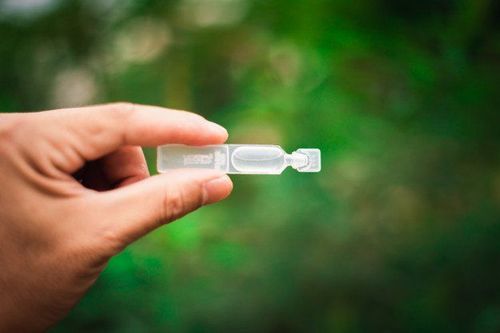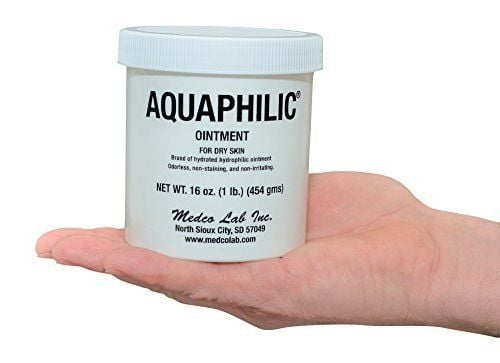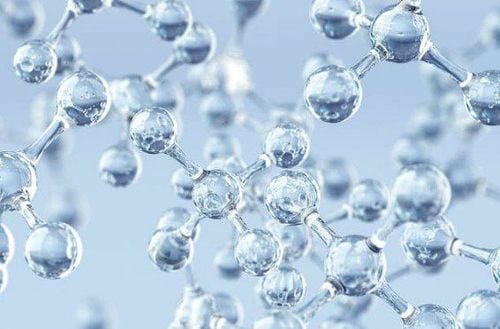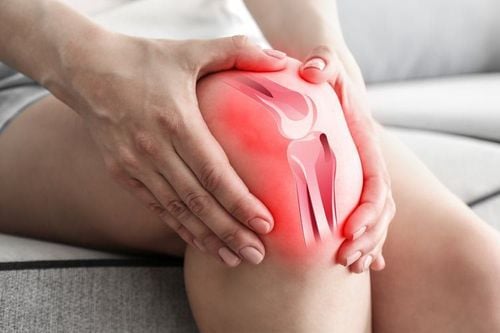This is an automatically translated article.
Hyaluronic acid, also known as hyaluronan, is a clear mucus that is naturally produced by your body. The greatest amount of hyaluronic acid in the body is found in the skin, connective tissue, and eyes. Its main function is to retain water, which keeps the body's tissues moist and well-lubricated. Hyaluronic acid has many uses. Many people consider it a supplement, but it is also used as a main ingredient in topical serums, eye drops, and injections. Here are 7 scientifically proven benefits of using hyaluronic acid.1. Promotes healthier, more supple skin
Supplementing with hyaluronic acid can help your skin look softer.About half of the hyaluronic acid in your body is in your skin, where it binds with water to help retain moisture. However, the natural aging process and exposure to things like UV radiation from the sun, cigarette smoke, and pollution can reduce the amount of hyaluronic acid in the skin.
Supplementing with hyaluronic acid can prevent this decline by providing your body with an extra dose to put into the skin. Doses of 120–240 mg daily for at least one month have been shown to significantly increase skin moisture and reduce dryness in adults.
Hydrated skin also reduces the likelihood of wrinkles appearing, which may explain why some studies show that supplementing with hyaluronic acid can make skin smoother.
When applied to the skin's surface, hyaluronic acid serum can reduce wrinkles, redness, and skin inflammation. Some dermatologists even inject hyaluronic acid fillers to keep skin firm and youthful.
In summary, the addition of hyaluronic acid can help increase skin moisture and reduce the appearance of wrinkles. Topical treatments can calm redness and inflammation, while hyaluronic acid injections can make skin firmer.

Bổ sung axit hyaluronic có thể giúp làn da của bạn trông mềm mại hơn
2. Hyaluronic acid can speed up wound healing
Hyaluronic acid also plays an important role in wound healing.It exists naturally in the skin, but its concentration increases when there is damage in need of repair. Hyaluronic acid helps wounds heal faster by regulating inflammation levels and signaling the body to create more blood vessels in the damaged area.
The direct application of hyaluronic acid to skin wounds has been shown to reduce wound size and relieve pain faster than placebo or no treatment at all.
Hyaluronic acid also has antibacterial properties, which can help reduce the risk of infection when applied directly to an open wound. Furthermore, it is effective in fighting gum disease, speeding healing after dental surgery, and eliminating ulcers when used topically in the mouth.
Although research on hyaluronic acid gels and serums is promising, there have been no studies to determine whether hyaluronic acid supplements can provide the same benefits.
However, because oral supplements increase the level of hyaluronic acid found in the skin, they may offer some benefit.
In conclusion, applying hyaluronic acid directly to an open wound can help speed up the healing process.
3. Relieves joint pain by keeping bones better lubricated
Hyaluronic acid is also found in joints, which helps keep bones lubricated.When the joints are lubricated, the bones will have less friction against each other, causing pain and discomfort.
Hyaluronic acid supplements are useful for people with osteoarthritis, a degenerative joint disease caused by wear and tear of the joints over time. Taking 80–200 mg daily for at least two months has been shown to significantly reduce knee pain in people with osteoarthritis, especially those between the ages of 40 and 70.
Hyaluronic acid can also be injected directly into the joint for pain relief. However, an analysis of 12,000 adults found only modest pain relief and a higher risk of side effects.
Some research shows that combining oral hyaluronic acid supplements with injections may help increase pain relief benefits and prolong the time between injections.
In summary, hyaluronic acid supplements are effective in reducing joint pain in people with osteoarthritis. Injections can also be used but may come with some risks.

Viên uống bổ sung axit hyaluronic có hiệu quả trong việc giảm đau khớp ở những người bị viêm xương khớp
4. Soothes GERD symptoms
New research shows that hyaluronic acid supplements can help reduce symptoms of GERD.When you have gastroesophageal reflux, the contents of the stomach back up into the throat, causing pain and damage to the lining of the esophagus. Hyaluronic acid can help soothe the damaged lining of the esophagus and speed up the recovery process.
One test-tube study found that applying a mixture of hyaluronic acid and chondroitin sulfate to acid-damaged throat tissue helped it heal much faster than when no treatment was used.
Human studies have also shown similar benefits. One study found that taking hyaluronic acid and chondroitin sulfate supplements along with an acid-reducing medication reduced reflux symptoms by more than 60% compared with acid-reducing medication alone.
A second study found that the same supplement was 5 times more effective at reducing acid reflux symptoms than a placebo. Research in this area is still relatively new and more research is needed to replicate these results. However, these results are still promising.
5. Relieves Dry Eye And Irritability
About 1 in 7 older adults experience dry eye symptoms due to decreased tear production or tears that evaporate too quickly.Because hyaluronic acid has an excellent moisturizing ability, it is often used to treat dry eyes. Eye drops containing 0.2–0.4% hyaluronic acid have been shown to relieve dry eye symptoms and improve eye health.
Contact lenses containing slow-release hyaluronic acid are also being developed as a possible treatment for dry eye disease. Additionally, eye drops containing hyaluronic acid are frequently used in eye surgery to reduce inflammation and speed wound healing.
Although topical application to the eyes has been shown to relieve dry eye symptoms and improve overall eye health, it is not clear whether oral supplements actually have the same effect. or not.
To date, there have been no studies examining the effects of hyaluronic acid supplementation on dry eye disease, but it may be an area of future research.
In a nutshell, hyaluronic acid is found naturally in the eyes and is often an ingredient in eye drops to relieve dry eye symptoms. However, there is no evidence that oral supplements have the same effect.

Axit hyaluronic được tìm thấy tự nhiên trong mắt và thường là một thành phần trong thuốc nhỏ mắt để giảm các triệu chứng khô mắt
6. Protects bone health
New animal research has begun to investigate the effects of hyaluronic acid supplements on bone health. Two studies have found that hyaluronic acid supplementation can help slow the rate of bone loss in mice with osteoporosis, the beginning stage of bone loss before osteoporosis.Test-tube studies also show that high doses of hyaluronic acid can increase the activity of osteoblasts, the cells responsible for building new bone tissue.
Thus, while its effects on human bone health have yet to be studied, early animal and test-tube studies are promising.
7. Can prevent bladder pain symptoms
About 3-6% of women have a condition called interstitial cystitis, or painful bladder syndrome.This condition causes abdominal pain and tenderness, along with the urge to urinate on a regular basis.
While the cause of interstitial cystitis is unknown, hyaluronic acid has been found to help relieve pain and decrease the frequency of urination associated with this condition when given directly into the bladder through a catheter.
It's not clear why hyaluronic acid helps relieve these symptoms, but researchers hypothesize that it helps repair damage to bladder tissue, making it less sensitive to pain.
However, studies have not yet determined whether oral hyaluronic acid supplements can increase the amount of hyaluronic acid in the bladder enough to cause the same effect.

Axit hyaluronic đã được tìm thấy để giúp giảm đau và giảm tần suất tiểu liên quan đến tình trạng viêm bàng quang kẽ
8. Possible side effects of hyaluronic acid
Hyaluronic acid is generally very safe to use, with few reported side effects.Because it is produced naturally by the body, an allergic reaction is rare. One study in 60 people with osteoarthritis taking 200 mg daily for one year found no negative side effects. However, its effects during pregnancy or lactation have not been well studied, so these groups should be cautious and avoid hyaluronic acid supplements
There is some evidence that cancer cells are sensitive to hyaluronic acid and taking supplements may make them grow faster. For this reason, it is often advised that people with cancer or a history of cancer avoid hyaluronic acid supplements.
Injecting hyaluronic acid into the skin or joints carries a higher risk of side effects. However, the negative reactions were mainly related to the injection procedure, rather than the hyaluronic acid itself.
Most people can safely use hyaluronic acid supplements and have many health benefits. Hyaluronic acid is well known for its skin benefits, especially for soothing dry skin, reducing the appearance of wrinkles, and speeding wound healing. It may also help relieve joint pain in people with osteoarthritis. Other notable uses include hyaluronic acid eye drops to relieve dry eyes and delivery of hyaluronic acid directly into the bladder via a catheter for pain relief. Overall, hyaluronic acid is a beneficial supplement for a variety of conditions, especially those related to skin and joint health.
Please follow the website ( www.vinmec.com ) for more information on health care instructions, which we will update regularly.
Please dial HOTLINE for more information or register for an appointment HERE. Download MyVinmec app to make appointments faster and to manage your bookings easily.
Reference sources: healthline.com, webmd.com












